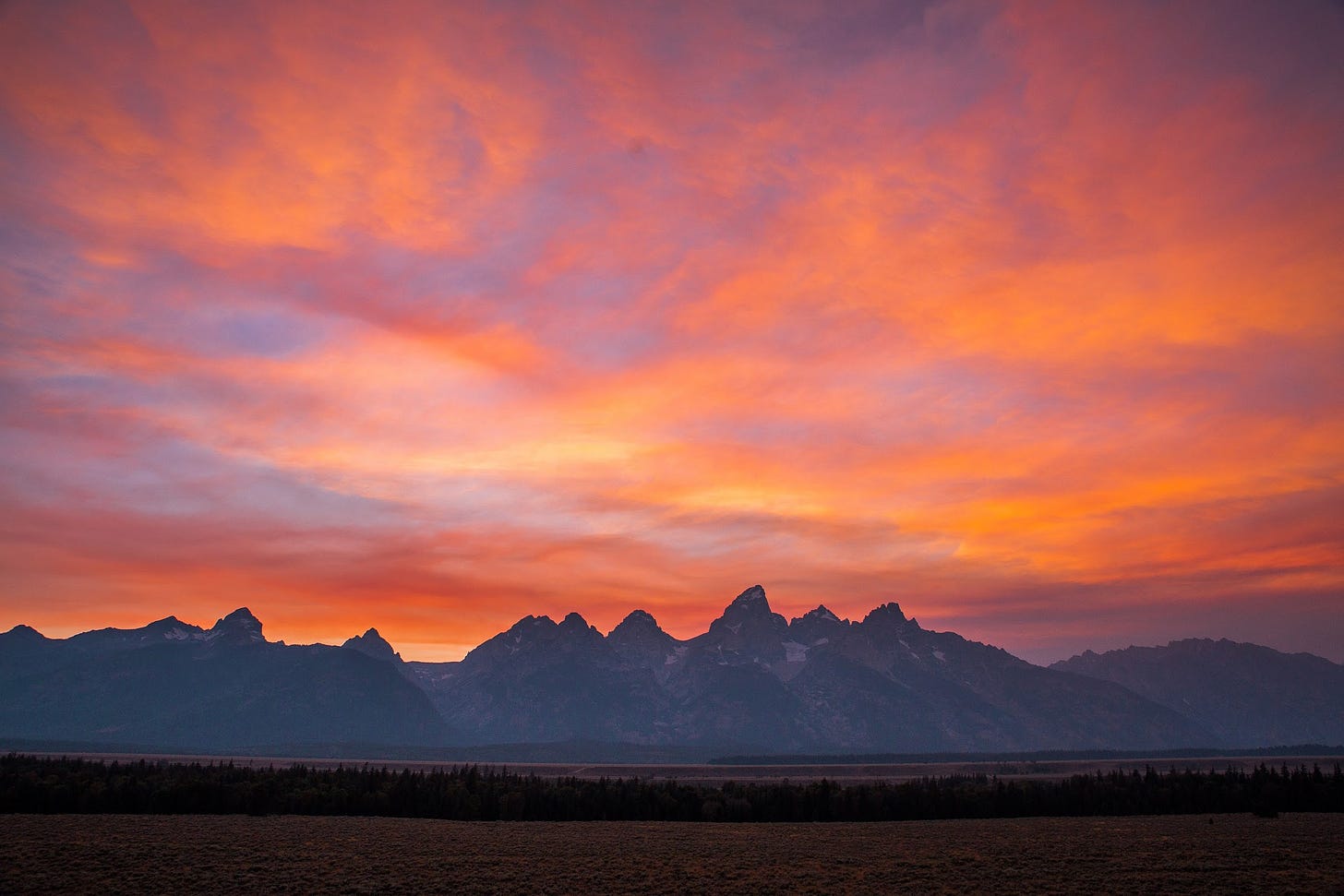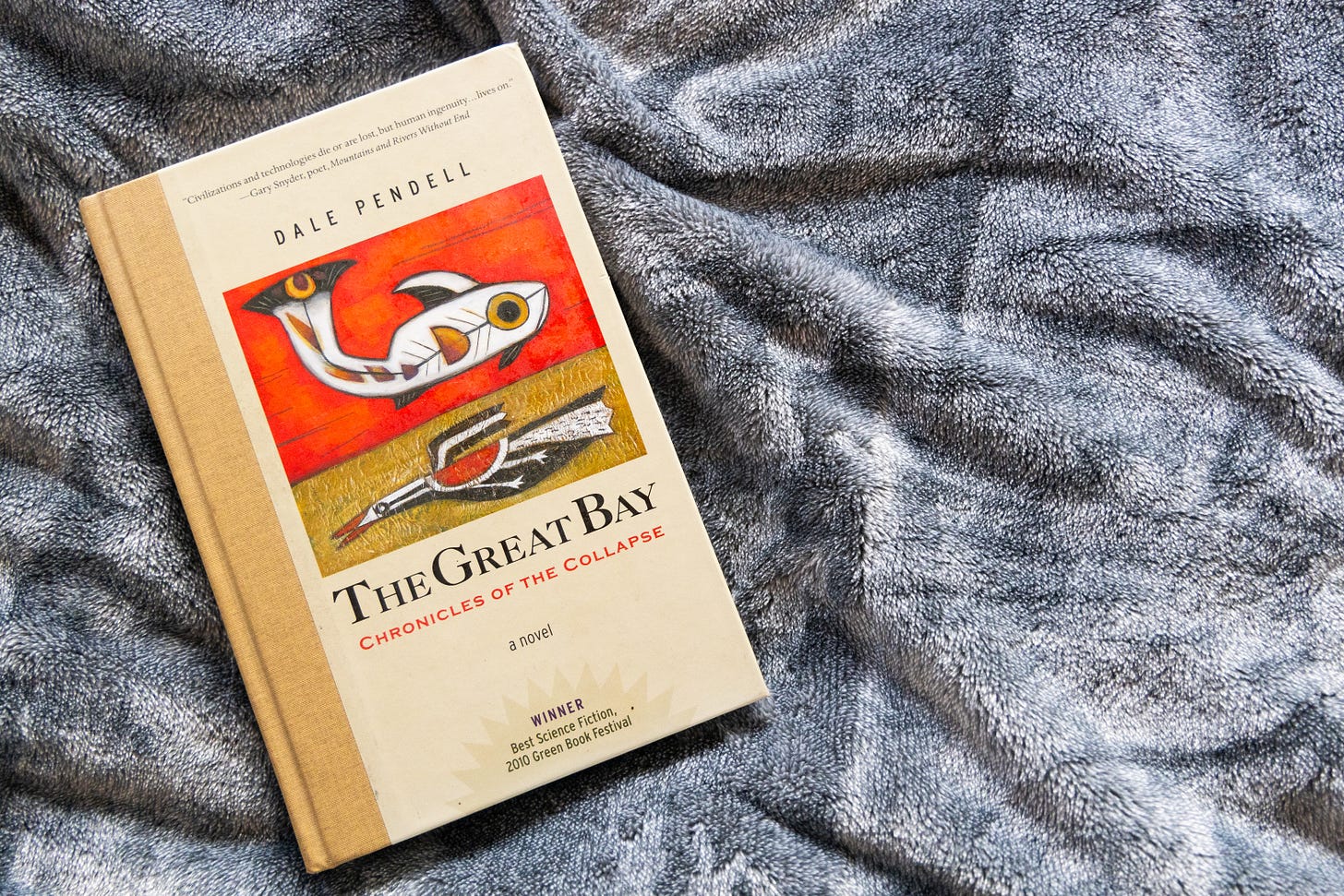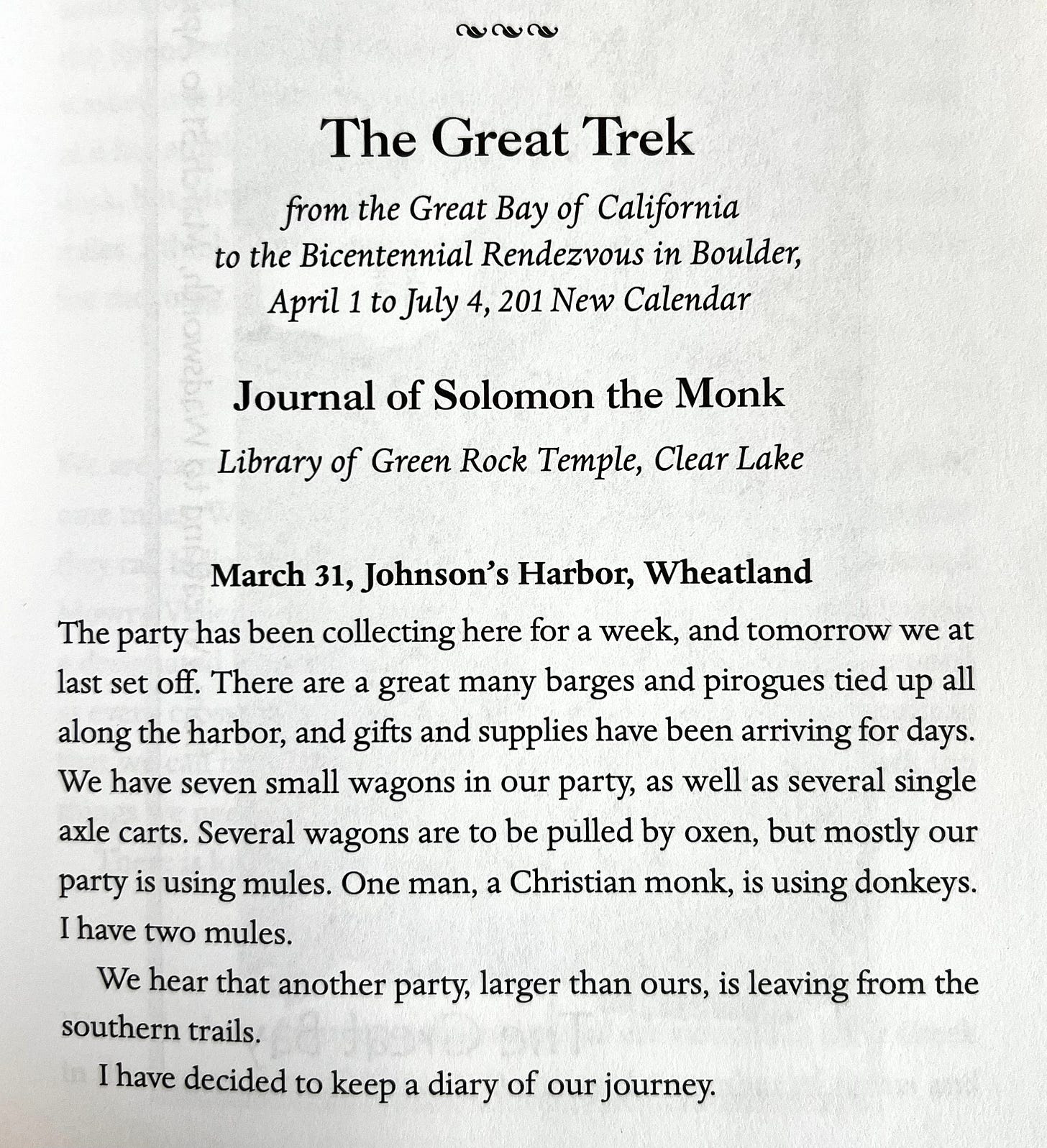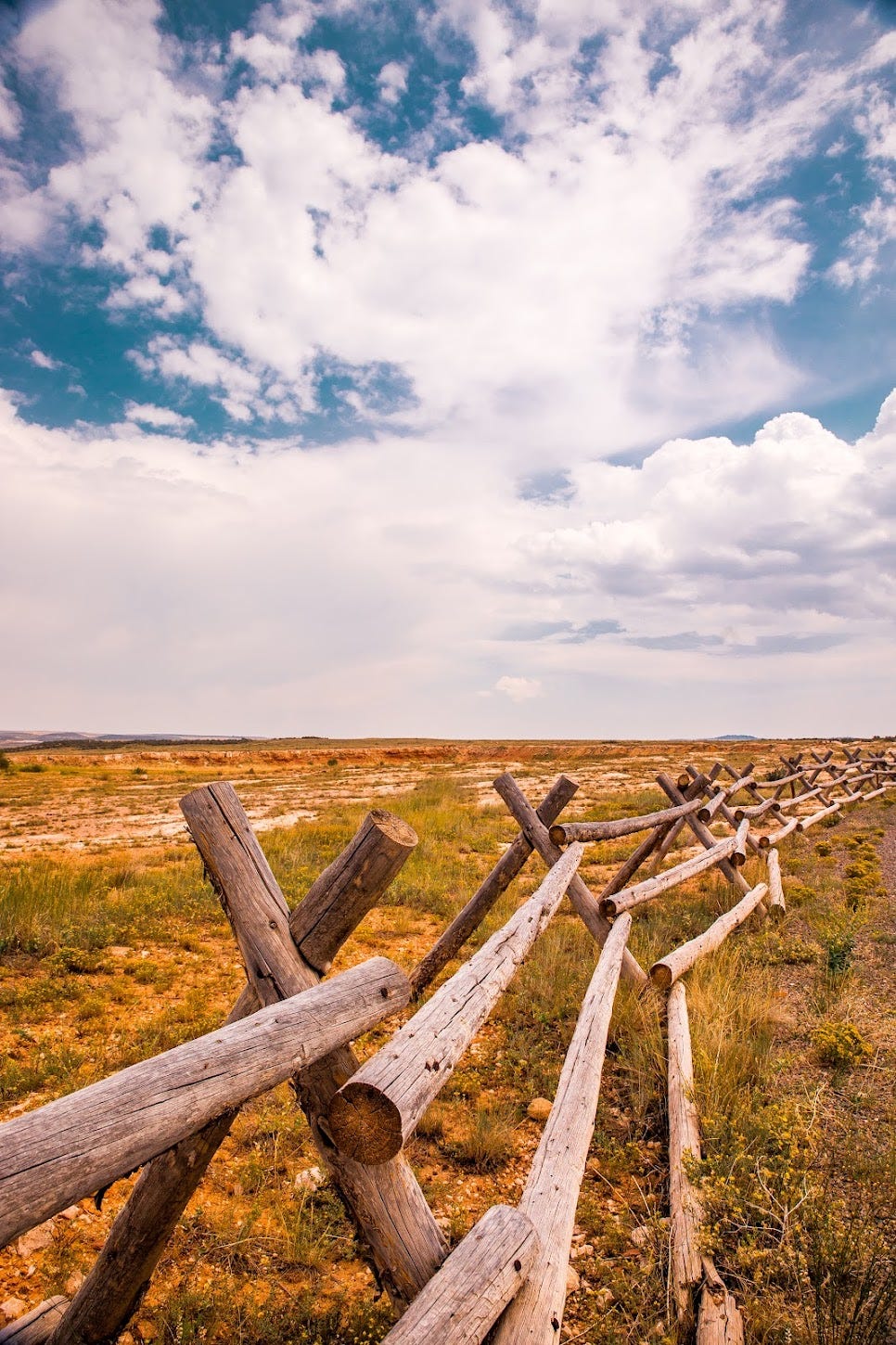In 2018, a teacher of mine told me about a book called The Great Bay: Chronicles of the Collapse by Dale Pendell. Pendell was a poet, ethnobotanist, and novelist, who died in early 2018, just months before I heard about his book.
I spent most of 2017 and 2018 in isolation. After getting divorced in late 2016, I moved into a cabin at the top of a windy road in Topanga Canyon, California, in hopes of starting a new life. This new life did eventually arrive, but not as quickly as I would have liked. First, the universe insisted I confront and transmute everything that had led me so far off my path. This took some time.
While I scoured the depths of my subconscious, confronting years of self-delusion and grief, the world around me seemed to be doing the same.
Trump’s election had only been the beginning. From the Women’s March and #Metoo, to the white supremacist rally in Virginia, Kaepernick’s taking a knee, raging wildfires (one of which forced me out of Topanga for nine days), devastating hurricanes, and the deadliest mass shooting in US history, the world seemed to be forcing us to confront everything we’d hoped to avoid.
As a millennial, it had always felt as if the world was crumbling, but now, that crumbling seemed to be giving way to full on collapse.
In August 2018, I bought The Great Bay, and set off on a solo road trip from California to Wyoming and Colorado.
Written in 2010, The Great Bay chronicles a fictional societal collapse, initiated by the 2020 election of an irresponsible and unqualified US President. One thing leads to another, and by 2021, a fatal pandemic sweeps across the globe, reducing global population to under 100 million, 1/80th of what it had been, and all traces of societal, political and economic infrastructure are destroyed. Civilization disappears, wildfires rage for years on end, and sea levels rise dramatically, ultimately flooding California’s Central Valley, creating a “great bay.”
Through first-person narrative, poetic imagery, fictional news reports, and interviews with survivors, Pendell tracks the evolution of humanity post-collapse, many years into the future.
One prominent storyline traces a group traveling from the Great Bay in California to Boulder, Colorado in an attempt to restart the government. The trip takes them through various parts of the country, and the journey is documented in diary entries by a character named “Solomon the Monk.”
Through Solomon’s diary entries, we are introduced to groups of people who live along his route, all of whom have developed unique tribal identities and customs. One stop he makes on his journey is Laramie, WY, where Solomon describes the local residents as having regressed into an extreme form of fundamentalist Christianity, where women accused of adultery are either stripped, shaved from head to toe, and publicly whipped, or stoned to death.
Strangely enough, the fictional route traveled by Solomon the Monk was almost identical to the actual route I had planned for my summer road trip. My first destination after leaving California was Laramie, WY, where I had planned to celebrate my 30th birthday by hiking out to the site where Matthew Shepard had been murdered, tied to a fence post, and left for dead in 1998. Morbid birthday celebration, I know, but for reasons I won’t elaborate on now, Matthew Shepard had long been somewhat of a spiritual guide for me, and it felt fitting to pay him a visit during such a transformative time.
Laramie, perhaps unsurprisingly, didn’t feel particularly hospitable or welcoming, and like the characters in The Great Bay, I decided to pass through as quickly as possible on our eerily parallel journey to Boulder. While the characters in The Great Bay had hopes of restarting the government, I was hoping to restart my life, and wanted my 30th birthday to initiate me into this new phase, which at the time I suspected might include moving to Colorado.
Reading The Great Bay while on this road trip turned out to be incredibly disorienting. Covid was still a year and a half away, but the prophetic accuracy of Pendell’s writing sometimes made it difficult to distinguish real life from fiction. To this day, I am still delighted by whatever trickster-like entity led me to read The Great Bay while on this trip.
Five years later, it’s clear how instrumental The Great Bay has been in shaping my worldview. At the time, the parallels and comparisons were obvious, not just to the immediate post-collapse events Pendell outlined, but also to Pendell’s vision for how humanity might evolve following the collapse of civilization.
In The Great Bay, humanity ultimately returns to where it all began — small, regional groups of people living sustainably, reciprocally, and in accordance with the natural world.
When Covid hit in 2020, part of me hoped that reality would unfold in accordance with Pendell’s fictional narrative. Without some kind of devastating intervention, I didn’t see any possibility for humanity to return to “where it all began.” Covid was devastating, but not nearly enough to provoke the collapse of civilization.
It’s been five and a half years since I read The Great Bay. Since then, I started (and am now ending) my podcast, A Millennial’s Guide to Saving the World. I’ve traveled the world, started a new relationship, forged new friendships, bought a house, and as anticipated, moved to Colorado. I’ve come to understand that civilizational collapse may not occur within my lifetime, or at all, but the stories of human resilience, survival and ingenuity in The Great Bay haven’t left me.
As Pendell writes in the afterword, “It is unlikely apocalypse will save us. Much more likely is a gradual degradation of quality of life…” After spending so many years anticipating (and even sometimes hoping for) an apocalypse, I’m becoming more inclined to trust Pendell’s prophetic wisdom that despite his compelling fictional narrative, our reality might end up looking far more mundane.
Sometimes I wonder what “collapse” might look like in the absence of apocalypse. If humanity actually manages to survive, how would our descendants characterize this current time in human history? How would we distinguish between “an ending” and “a beginning”? How would we discern the difference between emergency and emergence? Where are the boundaries and edges of metamorphosis?
In the absence of apocalyptic delineation, “collapse” becomes far more enigmatic. Without cataclysm and forced change, is it possible to act proactively in bringing about the change we hope to see? Ultimately, it seems it’s up to us to decide what role we wish to play.
Defining collapse in the absence of apocalypse, and taking responsibility for how our personal and collective narratives shape this definition, are two of the most thought-provoking inquiries propelling me into a new phase of this project.
As I announced in the most recent episode of A Millennial’s Guide to Saving the World, I’ve decided to stop the podcast after an incredibly fulfilling, five year, 141-episode run. This Substack will remain active, but will eventually be renamed.
I don’t have a new title yet, but I felt compelled to credit Dale Pendell’s The Great Bay for inspiring me to document my own “chronicles of collapse.”
More soon.
In the meantime, here’s a link to one of my favorite episodes of the podcast, where I read a passage from The Great Bay. I recorded this while evacuated from my home in late 2018 during the Malibu, CA Woolsey Fire.











What a text ! I'm adding " The great bay" to my reading list right now. It's hard to find words, Anya... Hard to not feel sadness...
But I know that you're on the right path and that Love and Truth will always be in your steps.
It's a very scorpionic post in a very scorpionic time. We're all craving Change with a big C, and we're gonna get it. We're changing, the planet is changing, let's just change and have faith in change. Even if it's just micro steps, even if we will not be able to see some results, the labour has begun worldwide... A New World is coming.
Love from Québec
Shocked and sad to see this but I understand the need to end a chapter and begin something new. I’m looking forward to seeing the great things you’ll go on to create.